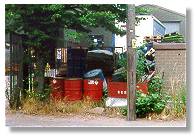|
- Preventing escape of waste: this requires that the waste be contained in such as way as to prevent spillage or leakage whilst still on site, or in transit or in storage. The containers must be clearly labelled, ideally, with a description of the waste on the actual label, not just in supporting documentation. They must be secured against theft, vandalism or other interference, and shielded from the weather. Vehicles used for transporting waste must be road-worthy and of appropriate design and construction.
- Providing comprehensive records: this means that an accurate written description of the waste must be provided by the waste producer and transferred with the waste at each stage. The description must be detailed enough to ensure that other people who may have to handle it know exactly how to deal with it safely, and especially how to handle it in an emergency, such as a spillage or a fire. Such details need to be included in the Transfer Note or Consignment Note (for Special waste) which must accompany all transfers of waste.
- Minimising waste at source: this should be part of an organisation?s waste management strategy. Options for minimisation include raw materials substitution, product (or process) re-design, re-use, product/packaging, recycling and waste treatment prior to disposal.
All producers of waste are required to use only registered waste carriers to dispose of their wastes at properly licensed sites. Organisations storing waste on their own sites must hold a waste management licence, and can be forced to remove unlawfully deposited wastes.
|
